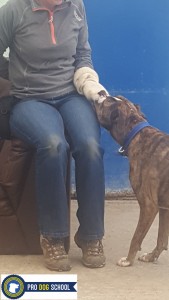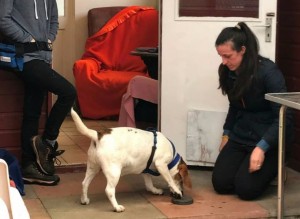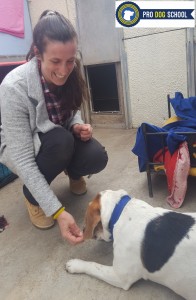10 Apr |
Posted by Holly Keeling |
no comments |
Assistance, dog, training
I’ve just returned from a five day #Superdogs course learning how to train dogs for assistance. The course was run by Nando Brown and Jo-Rosie Haffenden of School of Canine Science who had their own TV series on Channel 4 last year called Rescue Dog to Super Dogs. And that’s what we did this last week, we trained rescue dogs at the National Animal Welfare Trust (NAWT) in Watford to be Superdogs. We had them doing tasks such as retrieving dropped items, interrupting/alerting tourettes tics, removing socks and covers for people and opening and emptying the washing machine.

Lola in the early stages of learning to pull socks off
The course taught us that there are five foundation behaviours for most assistance behaviours and if you can teach a dog these five behaviours solidly you can transfer them to most tasks that you would require them to do as an assistance dog. I am hoping to run a workshop covering these five tasks in the near future. We were also taught how to hand select a rescue dog for a person requiring assistance and how to integrate it into the household.

My assistance dog Jessie, 8yr Beagle

Training Jessie to target on command
I was given Jessie, an eight year old Beagle, who had been as the shelter for four years, to be my assistance dog for the five days. I was given a case study of a 17 year old boy with tourettes who would involuntarily shout and often yerk his head backwards. His disability caused him embarrassment and pain. I chose to teach Jessie to jump up with her front paws on my thigh when I jerked my head back. This would in theory help to distract the tourettes sufferer and redirect him onto something calming like stroking Jessie’s head, reducing his anxiety and thus likelihood of continued tics. Here’s a short video of us practising …
and here’s one with Louise as my stooge:
I learnt that a disabled person can only register for an assistance dog if they only have one health complaint. This leaves those with more than one disability at a disadvantage and means that they need to largely seek a trainer to train a dog for them or they need to train themselves. There is a fairly new charity called Canine Generated Independance (CGI) who support people in this position. They have just partnered with #Superdogs to help more people to train their own dog and skip the two year waiting list and £20,000 price tag for some pre-trained assistance dogs. I also learnt that if an assistance dog helps their owner with three or more tasks then they are allowed in to shops with them, regardless of whether they are with a registered charity or not.
I can’t wait to start helping people with disabilities to train their own dogs! 

Me and Jessie

Me and Jessie
Pro Dog School. Reward the good, prevent the bad.
About the Author: Holly Keeling. Dog Trainer in Sussex, England. Mother to furrbaby Leskie 5yrs and little humans Teddy 3yrs and Louie 1yr. Outdoor lover. A blog about raising kids and dogs and my life as a dog trainer. View more blogs here.